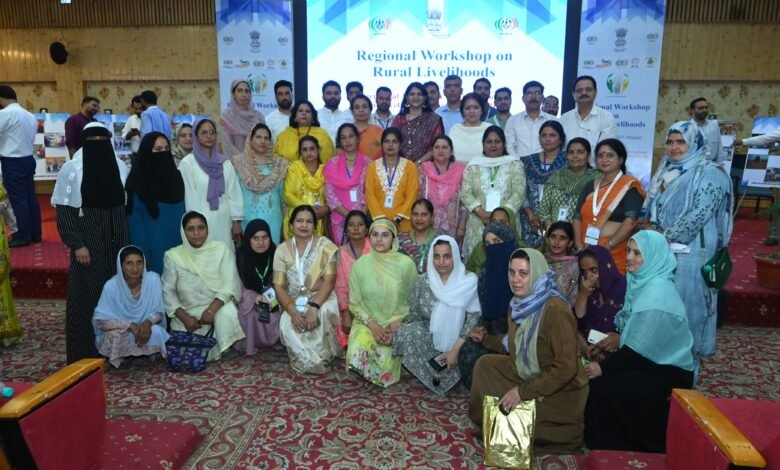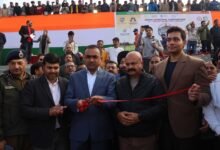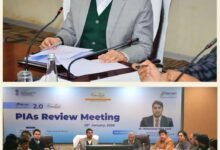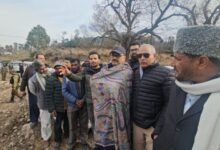NRLM Concludes 2-Day Regional Workshop on Rural Livelihoods at SKUAST Kashmir

NRLM Concludes 2-Day Regional Workshop on Rural Livelihoods at SKUAST Kashmir
Focus on Enhancing SHG Impact and Digital Integration to Propel Rural Development Across Northern States:
Srinagar: A two-day Regional Workshop on Rural Livelihoods concluded today at Sher-e-Kashmir University of Agricultural Sciences and Technology (SKUAST) Kashmir, focusing on enhancing Self-Help Group (SHG) livelihoods through convergence.
The Regional Workshop organised by DAY NRLM, Ministry of Rural Development, GoI was hosted by Jammu and Kashmir Rural Livelihoods Mission (JKRLM), Department of Rural Development and Panchayati Raj Govt of J&K.
The focus States/UTs were Uttaranchal , Himachal Pradesh, Ladakh, Punjab, Haryana and Jammu & Kashmir.
This Workshop was a part of a series of five Regional Workshops being organized by NRLM in the 5 Lakhpati Didi zones. It aims to deepen, strengthen, and expand livelihood opportunities for rural SHG women.
The workshop was virtually inaugurated by Sh. Shailesh Kumar Singh, Secretary, Ministry of Rural Development in the presence of Charanjit Singh, Additional Secretary, NRLM, MORD, Ms. Swati Sharma, Joint Secretary, NRLM, MORD, Sh. Gyanbhushan, Senior Economic Adviser, Ministry of Tourism, Govt. of India, Dr. Shahid Iqbal Choudhary, Secretary, Rural Development and Panchayati Raj, J&K, Ms. Mridhu Slathia, Additional Mission Director JKRLM Jammu Division, Sh. Reyaz Ahmad Beigh, Additional Mission Director JKRLM Kashmir division, Mission Directors of the participating SRLMs , National Mission Management Unit, State Project Managers/District Project Managers/Block Project Managers.
In his inaugural address, Secretary, Ministry of Rural Development highlighted rural livelihoods as a critical component in this journey, acknowledging the numerous challenges faced, including limited infrastructure, inadequate access to credit, employment issues, and skill gaps.
He also emphasised the importance of the extensive network of Self-Help Groups (SHGs) as a powerful tool for addressing these challenges.The Secretary MoRD stressed the importance of building reliable supply chains for rural products and leveraging digital platforms for marketing.
Additional Secretary, NRLM, MORD, Sh. Charanjit Singh highlighted significant human resource challenges that are hindering the effective implementation of NRLM programs, particularly in northern states.
He emphasized the critical need for filling vacant posts, providing timely credit and establishing a robust HR policy to ensure the smooth operation and success of various developmental areas.
Ms. Swati Sharma, Joint Secretary, NRLM, MoRD, GoI while setting the context for the Regional Workshop emphasized on the crucial need for innovation and technological adaptation to enhance rural livelihoods.
She highlighted the opportunities and the potential of the six Northern State Rural Livelihood Missions (SRLMs) and stressed the importance of leveraging past successes to drive future growth. Sharma outlined key areas for improvement, including access to formal credit systems, infrastructure, marketing avenues, advanced technologies, and entrepreneurial skill sets. She focussed on the necessity for embracing technological changes and ensuring that rural workers are not only tech-savvy but also able to make a mark on the global stage.
Secretary RD and PR, Govt of J&K, Dr. Shahid Iqbal Choudhary while highlighting the importance of the two day Regional Workshop said that the workshop will be instrumental for SRLMs in identifying and addressing challenges, and in exploring new growth opportunities through expert guidance which in return, promises substantial benefits for the SHGs.
Experts from Technical Support Agencies, convergence partners of Ministry of Rural Development, subject matter experts from various quarters from both farm and non-farm livelihoods Ministry of Agri, Ministry of Textiles, DGFT, CFTRI, Deptt of Animal Husbandry GoI , Punjab Agriculture University, CSIR – HP, Ministry of Tourism, CII, NIFT , IIM Jammu , SKAUST Kashmir, National Institute of Rural Development, Indian Meteorological Department, BIS and others participated in the workshop with full zeal and vigour.
Speaking at the workshop Mission Director, JKRLM , Ms. Indu Kanwal Chib expressed her happiness and felt honoured for JKRLM being given a chance in hosting this significant Regional Workshop on Rural Livelihoods. She highlighted the importance of bringing together representatives from the six states and Union Territories to strategize on enhancing rural livelihoods through various interventions and approaches.
The two day workshop covered crucial aspects of livelihood, including value chain improvements, market linkages, service sector growth, and technological interventions. Experts from diverse fields, including tourism, textiles, agriculture, animal husbandry, food technology, and meteorology, contribute to the dialogues.
In addition, as part of making of 3 crore Lakhpati Didis, NRLM had organised special sessions on filling of Digital Aajeevika Registers.
Towards the end of the workshop all the six states/ UTs delivered presentations reagrding the activities being carried on in each of the states/UTs, the successful interventions and the challenges faced during the implementations of the interventions.
Earlier, Ms. Swati Sharma, Joint Secretary, NRLM, MoRD, GoI visited a remote area in Drugmulla in district Kupwara where she interacted with the women Self Help Groups of JKRLM. She visited a restaurant , hollow brick unit and Bungus valley FPO successfully run by SHG women of JKRLM. She talked to the SHG members regarding electronic uploading of JKRLM data in this remote block before having a detailed interaction with SHG didis in DMMU Kupwara in presence of Deputy Commissioner Kupwara Ms Ayushi Sudan.
The delegates of all the five states and the thematic experts also visited the UMEED women haat at Dal lake and were given an idea of the products prepared by the UMEED rural women in the UT of J&K.
An outcome report is under preparation in order to get a road map for future based on the learnings.





